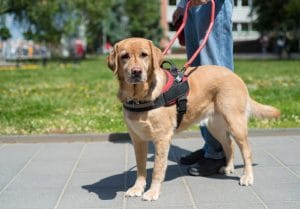Where Can I Bring My Service Dog In Tennessee?
 More and more public places are starting to accommodate service and support animals, understanding the important role they play in people’s day-to-day lives. People with disabilities and other physical or psychiatric issues depend on their four-legged friends to cope with the challenges of daily living. However, with wild stories of people attempting to bring pigs (and even peacocks!) on airplanes in the name of service or support, recently the general public has become skeptical about many service animals.
More and more public places are starting to accommodate service and support animals, understanding the important role they play in people’s day-to-day lives. People with disabilities and other physical or psychiatric issues depend on their four-legged friends to cope with the challenges of daily living. However, with wild stories of people attempting to bring pigs (and even peacocks!) on airplanes in the name of service or support, recently the general public has become skeptical about many service animals.
There is a difference between service and support animals, and the Americans with Disabilities Act (ADA) outlines what constitutes a service animal as well as where one may accompany you.
The ADA and service dogs
The Americans with Disabilities Act was passed in 1990 as a civil rights law to prevent discrimination against individuals with disabilities. This means in all areas of life – in the workplace, school, restaurants, transportation and all places open to the general public. The purpose of the ADA is to simply provide people with disabilities the same rights and opportunities as everyone else.
Many people with disabilities can use service dogs to help them maneuver more easily through everyday life. These types of dogs can help visually impaired people walk through the city, warn owners of an oncoming seizure or alert a diabetic to low blood sugar levels. Or, if a person’s movement or motor skills are limited, they can fetch objects for them.
Because these animals are performing work tasks and necessary assistance, the ADA classifies them as service animals. This means service animals – limited by the ADA to dogs, and in some cases, miniature horses – are permitted to accompany their owners just about anywhere in public.
Airlines are not bound by the ADA, but they do follow the Air Carrier Access Act (ACAA), which provides certain rights to passengers with service and support animals. Additionally, under the ADA, emotional support, therapy or comfort animals are not considered service animals. They don’t qualify because they haven’t been trained to perform a specific job or task. You might have seen comfort or support dogs in court before – Tennessee has eight courthouse dogs to help alleviate the stress and anxiety of witnesses on the stand.
Speaking of emotional support dogs, have you met our Stella? She brings happiness and comfort to everyone here at Miller Upshaw!
Tennessee laws and service animals
Tennessee law regarding service animals generally mirrors federal ADA law. Public places are prohibited from asking you questions about your disability or from asking for certification regarding your service dog. An establishment can ask if your dog is a service animal, and what tasks it performs, if it’s not apparent.
The ADA does not provide protections if your service dog is excluded from a public place for dangerous behavior, such as growling, acting aggressively or damaging the premises.
In July 2019, a new law went into effect in Tennessee for landlords and tenants. This requires landlords to require exceptions in their leases to no-pet policies for tenants who require the use of a service or support animal. A tenant may submit documentation proving a disability and the need for a service or support animal. If a tenant misrepresents themselves regarding a disability, their lease may be terminated along with associated fees and they may be charged with a Class B misdemeanor.
If you have any questions about family law, the attorneys at Miller Upshaw Family Law, PLLC are happy to speak with you. Let us advocate for you and your family. Please call 615-391-4200 or use our contact form to schedule a consultation at our Nashville office.

Karla C. Miller has devoted her entire career to the practice of family law in Tennessee. She attended Auburn University and Nashville School of Law, and upon graduation in 1996, she opened her own law firm and has been assisting families throughout Tennessee since then. Learn more about Karla C. Miller here.
